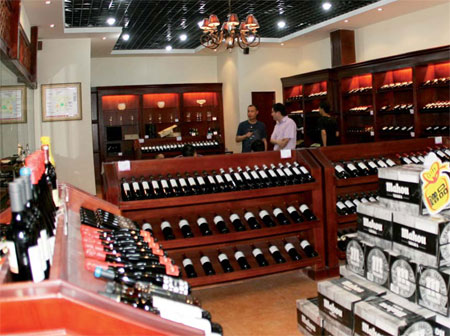Win the battle, don't fight the war
Updated: 2012-08-24 09:22
By Yan Yiqi (China Daily)
|
|||||||||||
|
Imported wines in a shop in Ningbo, Zhejiang province. The China Alcoholic Drinks Association has asked the Ministry of Commerce to launch an investigation into wine imports from the EU. Zhang Heping / for China Daily |
Despite the tit-for-tat skirmishes between China and its major trade partners the United States and the European Union, analysts say full-scale trade wars are unlikely as no one will benefit, especially considering the world's fragile economic situation.
On Aug 20, China's Ministry of Commerce ruled that some policies the US had adopted to support its renewable energy industry contravene World Trade Organization anti-subsidy rules, and it called on the US to rectify those policies.
On the same day, the China Alcoholic Drinks Association asked the ministry to launch an investigation into wine imports from the EU, accusing them of dumping.
These actions are considered China's responses to the US' and the EU's probes into China's renewable energy goods, and had led some to believe that a large-scale trade war between China and its two largest trading partners is in the offing. However, experts believe everyone would lose in that situation.
Feng Zhongping, director of the Institute of European Studies at China Institutes of Contemporary International Relations, says the intensifying trade disputes are largely related to the worsening global economy.
"China is fighting back against the trade protectionism adopted by other countries. The EU and the US have been more aggressive in launching probes into Chinese goods in recent years, because of the current economic circumstances. Both regions have the economic crisis to deal with, and they are trying to protect their own markets and local companies, which is a natural reaction," he says.
Feng says the trade frictions will continue to be intensified, but a trade war is not likely to happen because it will cost too much.
|
|
"Negotiation and then compromise on both sides is the most desired solution, and I believe all parts will finally make satisfactory agreements that can maximize their interests," he says.
Li Jian, a researcher with the International Trade and Economic Cooperative Research Institute, a think tank under the Ministry of Commerce, says all parties involved in the disputes today are rational enough to solve the friction in a peaceful way.
"Compared with the Great Depression in 1929, the countries today are more connected and no country will be a complete victor in a trade war. In many industries, Chinese companies are just a key link in the global industrial chain, the loss of Chinese companies will also affect the survival of other points of the whole chain," he says.
Shen Danyang, a spokesperson for the Commerce Ministry, said at a news conference that the EU's possible restrictions against China's solar companies will make its local companies reap what they have sown.
"Chinese companies imported 40 billion yuan ($6 billion, 5 billion euros) worth of solar-panel production equipments, and 45 percent of them were from European companies," he says.
Frank Heinricht, chairman of German heavy metal and technology company Heraeus Holding, said in an interview that the European Commission should reject European companies' appeal to charge higher duties on Chinese solar products.
"Higher import duties are against the core spirit of free trade and market competition. Looking at the long-term perspective, no company will benefit from this," he said.
In July, European solar companies asked the European Commission to probe Chinese exports to the EU. The commission will decide in September whether to launch the probe.
This appeal was submitted right after the US announced anti-dumping duties on Chinese solar product makers ranging from 31 percent to 250 percent. The final decision will be made in October.
"Renewable energy is one industry in which Chinese companies are very competitive in the international market, so it becomes a target. This time, China is getting wiser and more mature in protecting its own commercial interests under the WTO framework," says Li from the International Trade and Economic Cooperative Research Institute.
As for China, he says it is better for local industries, not only the renewable energy industry, to look back and improve vulnerable points.
"It is an opportunity for China to think about how to change the traditional way of stimulating trade growth and adopt a healthier and more scientific way. Some of China's industries are expanding too fast, which leads to them lacking key technologies and certain market regulations. Chinese companies should try to be competitive not only in terms of price, but also in technology," Li says.
yanyiqi@chinadaily.com.cn
Related Readings:
Officials seek talks with EU over solar trade probe
The European Commission is likely to launch an anti-dumping investigation against China's solar industry, the China New Energy Chamber of Commerce said on Wednesday as it called for dialogue to settle the dispute.
Producers see red over 'wine subsidies'
The government has been asked to investigate if European winemakers are being subsidized and dumping their produce in China, a move analysts said is Beijing’s latest response to the European Union’s rising trade protectionism against China.
European judgment opens door to Chinese firms
The European Court of Justice on July 19, 2012 gave a landmark judgment in which a Chinese chemicals company, Zhejiang Xinan Chemical Industrial Group Co, was cleared of accusations of unfair trade practices and that the Beijing government was controlling its trade with the European Union.
Today's Top News
Rescuers race against time for quake victims
Telecom workers restore links
Coal mine blast kills 18 in Jilin
Intl scholarship puts China on the map
More bird flu patients discharged
Gold loses sheen, but still a safe bet
US 'turns blind eye to human rights'
Telecom workers restore links
Hot Topics
Lunar probe , China growth forecasts, Emission rules get tougher, China seen through 'colored lens', International board,
Editor's Picks

|

|

|

|

|

|







